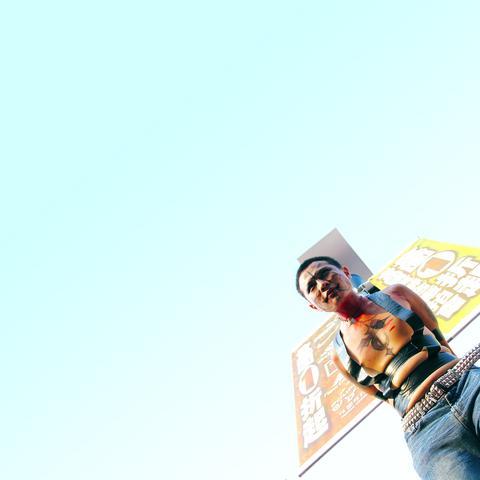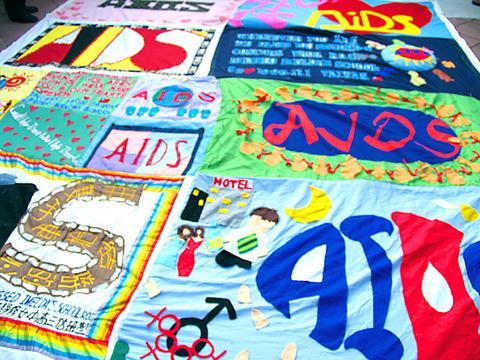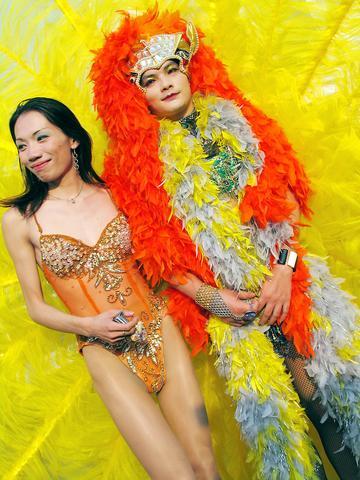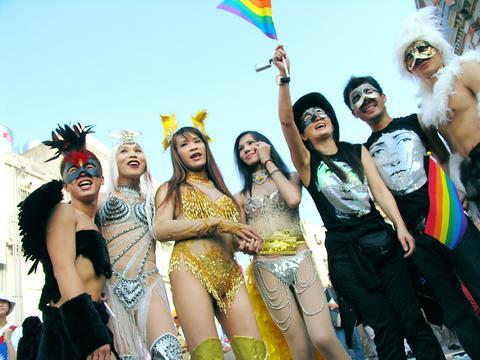Those gathering at Chiang Kai-shek Memorial Hall on Saturday afternoon for the second annual Taiwan Lesbian, Gay, Bisexual, Transgender Pride Parade (台灣同志大遊行) were greeted by admonitions from a Christian group warning homosexuals, "If you do not change your sexuality, you will not enter heaven."
Another group of Christians took a more embracing approach, choosing rather to invite parade-goers to Sunday church services. But while the church took a divided stance, Taiwan's homosexual community chose to unite.

PHOTOS: JULES QUARTLY, TAIPEI TIMES
Organizers estimated around 3,000 people turned up to have their voices heard, their presence felt, and -- because it was a parade -- to fill the streets with music, dancing and bacchanalian revelry.

The parade gathered followers, both gay and straight, as it flowed past 228 Park, a well-known homosexual enclave immortalized in novelist Kenneth Pai's (
One female marcher who joined the party said, "I'm not gay, but I came because I have many gay friends and I want to support them."

Parade organizers from the Taiwan Tongzhi Hotline Association (

Despite fears of facing the media cameras, many young gays came out of the proverbial closet in order to support the Parade and their community.
"I know my parents might see me, but I think it is also important for me to be here," said one university student attending the parade.
Excited photographers captured images of a small minority of parade goers dressed in various costumes, including a group dressed as the holy figure Kuan Yin, a group of young men called the Waterboys clad in just Speedos, as well as drag queens wearing costume jewelery and thick layers of make-up.
What most photographers did not capture were images of followers carrying an AIDS quilt, or quiet homosexual couples marching hand-in-hand, some boasting legally unrecognized unions outlasting many heterosexual marriages.
The fact that the parade-goers did not encounter much societal disapprobation, save the Christian saviors and the occasional annoyed motorist, might cast Taiwan as a gay-friendly Shangri La.
However, when the Parade spilled into the courtyard outside Red Playhouse in Ximending, two homosexuals from Kaohsiung testified to the contrary, reporting frequent police harassment and gay arrests on trumped-up charges.
This testimonial from the south both underscored Taipei's unique position as a liberal outpost in Taiwan and also the need for similar gatherings that will further shed light on existing discrimination.
Following the sober reminders, organizers attempted to rally the group into repeating various contrived chants of resistance borrowed from similar protests rallies around the world. It was a call to action that did not quite pass muster with the crowd. However, pop-diva Sandy Chen (
Other public figures, including university professors and Taiwanese starlets, taped messages that were broadcast on the large screen across from the Ximending MRT station.
DJ Victor Cheng, who mixed records and led the parade on a truck with a sound system, summed up this year's Pride Parade thus: "When my friends try to compare this parade to larger events in the US, I remind them that this is how parades in the US got their start ... the turnout this year proves that the parade will continue to become stronger."
Last year, 1,000 people participated and the larger-scale event this year may indeed bode well for the Pride Parade's future in Taiwan, yet one attendee took a more jaded and perhaps more realistic view of Taiwan's state of affairs. "Society doesn't have a problem with gay people in the public sphere, but when gays enter the home, when a gay is in their family, that's where they draw the line."
True enough, unlike similar manifestations in New York, San Francisco, or Sydney, one did not catch a glimpse of parents out to support their gay children. But reaching that level of acceptance might be a long-term project, or at least an aspiration for the next Taiwan Pride Parade.

The 2018 nine-in-one local elections were a wild ride that no one saw coming. Entering that year, the Chinese Nationalist Party (KMT) was demoralized and in disarray — and fearing an existential crisis. By the end of the year, the party was riding high and swept most of the country in a landslide, including toppling the Democratic Progressive Party (DPP) in their Kaohsiung stronghold. Could something like that happen again on the DPP side in this year’s nine-in-one elections? The short answer is not exactly; the conditions were very specific. However, it does illustrate how swiftly every assumption early in an

Francis William White, an Englishman who late in the 1860s served as Commissioner of the Imperial Customs Service in Tainan, published the tale of a jaunt he took one winter in 1868: A visit to the interior of south Formosa (1870). White’s journey took him into the mountains, where he mused on the difficult terrain and the ease with which his little group could be ambushed in the crags and dense vegetation. At one point he stays at the house of a local near a stream on the border of indigenous territory: “Their matchlocks, which were kept in excellent order,

Jan. 19 to Jan. 25 In 1933, an all-star team of musicians and lyricists began shaping a new sound. The person who brought them together was Chen Chun-yu (陳君玉), head of Columbia Records’ arts department. Tasked with creating Taiwanese “pop music,” they released hit after hit that year, with Chen contributing lyrics to several of the songs himself. Many figures from that group, including composer Teng Yu-hsien (鄧雨賢), vocalist Chun-chun (純純, Sun-sun in Taiwanese) and lyricist Lee Lin-chiu (李臨秋) remain well-known today, particularly for the famous classic Longing for the Spring Breeze (望春風). Chen, however, is not a name

There is no question that Tyrannosaurus rex got big. In fact, this fearsome dinosaur may have been Earth’s most massive land predator of all time. But the question of how quickly T. rex achieved its maximum size has been a matter of debate. A new study examining bone tissue microstructure in the leg bones of 17 fossil specimens concludes that Tyrannosaurus took about 40 years to reach its maximum size of roughly 8 tons, some 15 years more than previously estimated. As part of the study, the researchers identified previously unknown growth marks in these bones that could be seen only